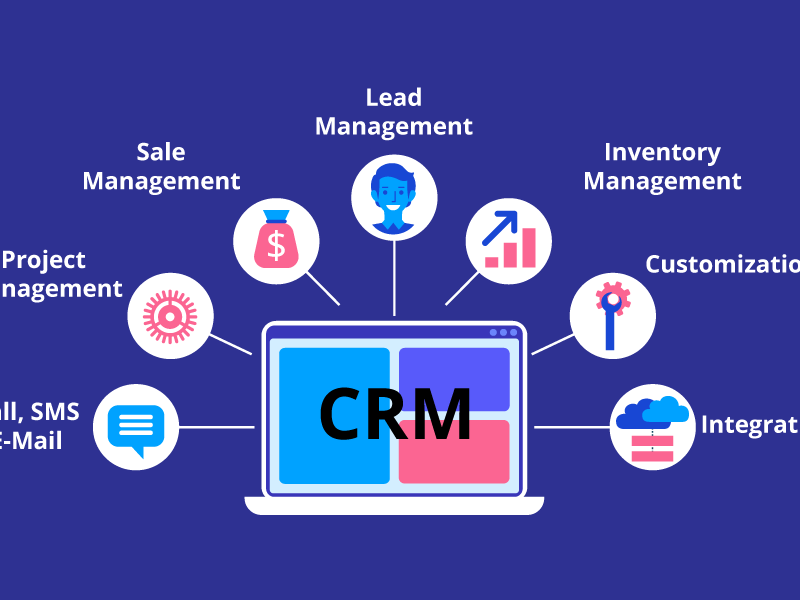Customer Relationship Management (CRM) systems have become pivotal in the modern business landscape, fundamentally reshaping the way companies interact with their customers.
By integrating advanced technologies and data analytics, CRM solutions enable businesses to gain deeper insights into customer behaviors, preferences, and needs. This, in turn, facilitates more personalized and efficient engagement, enhancing customer satisfaction and loyalty.
The impact of CRM on customer experience is profound, driving not only operational improvements but also fostering a more meaningful and enduring connection between brands and their clientele. As businesses increasingly recognize the value of customer-centric strategies, the role of CRM in delivering exceptional experiences becomes ever morecritical.
The Impact of CRM on Customer Experience
Customer Relationship Management (CRM) systems have revolutionized the way businesses interact with their customers, significantly enhancing the overall customer experience.
By integrating various aspects of customer interactions, such as sales, marketing, and service, CRM systems provide a comprehensive view of customer data, enabling businesses to tailor their strategies to meet individual needs and preferences.
This personalized approach not only improves customer satisfaction but also fosters loyalty and drives long-term growth.
Enhancing Personalization through CRM
One of the most significant ways CRM systems impact customer experience is by enabling businesses to deliver highly personalized interactions. By collecting and analyzing customer data, CRM systems can provide insights into customer behavior, preferences, and history.
This information allows businesses to create targeted marketing campaigns, offer relevant products and services, and provide personalized support. As a result, customers feel valued and understood, leading to higher satisfaction and loyalty.
Improuing Customer Service with CRM
CRM systems play a crucial role in enhancing customer service. By centralizing customer information, agents can quickly access a customer’s history, past interactions, and preferences, ensuring that they can provide prompt and accurate assistance.
This not only speeds up resolution times but also ensures that customers receive a consistent and high-quality service experience, regardless of the channel they use to contact the business. The result is a more positive customer experience and increased customer retention.
Streamlining Sales Processes with CRM
CRM systems also streamline sales processes, making them more efficient and effective. By automating tasks such as lead management, sales tracking, and follow-up, CRM systems help sales teams focus on building relationships and closing deals.
This automation reduces the likelihood of errors and ensures that no leads are overlooked. Moreover, CRM systems provide valuable insights into sales performance, enabling businesses to identify trends, optimize strategies, and improve overall sales efficiency.
These improvements contribute to a more positive customer experience by ensuring that customers receive timely and relevant sales support.
| Aspect of CRM | Benefits for Customer Experience |
|---|---|
| Personalization | Targeted marketing, relevant offers, and tailored support |
| Customer Service | Quick and accurate assistance, consistent and high-quality service |
| Sales Processes | Efficient lead management, optimized sales strategies, and timely support |
How does CRM enhance customer experience?
A Customer Relationship Management (CRM) system significantly enhances the customer experience in several ways. Firstly, it centralizes customer data, allowing businesses to access a comprehensive view of each customer’s interactions, preferences, and history.
This holistic view enables personalized interactions and tailored communications, which can greatly improve customer satisfaction. Secondly, CRM systems automate routine tasks, such as follow-up emails and appointment scheduling, reducing the likelihood of errors and freeing up staff to focus on more value-added activities.
Lastly, CRM systems provide valuable insights through analytics, helping businesses identify trends, predict customer behavior, and proactively address issues before they become problems. These capabilities collectively contribute to a more seamless, personalized, and efficient customer experience.
Personalization and Customer Insights
Personalization is a key aspect of enhancing the customer experience. CRM systems gather and analyze vast amounts of customer data, including purchase history, website interactions, and social media activity.
This data is used to create detailed customer profiles, which businesses can leverage to deliver personalized content, recommendations, and offers. Personalization can significantly improve customer satisfaction and loyalty. For example, a CRM system might:
- Send targeted marketing emails based on a customer’s browsing history and past purchases.
- Recommend products that complement items previously bought by the customer.
- Offer special promotions to customers who have shown a particular interest in certain product categories.
Efficient and Seamless Customer Service
CRM systems streamline customer service processes, ensuring that customers receive timely and accurate assistance. By centralizing customer data, CRM systems enable service representatives to quickly access relevant information, such as previous interactions, service requests, and support tickets.
This leads to more efficient and effective problem resolution. Additionally, CRM systems can automate routine tasks, such as ticket routing and follow-up communications, which enhances the overall customer service experience. For instance:
- A service representative can instantly view a customer’s entire interaction history, providing context for the issue at hand.
- Automated ticket routing ensures that customer inquiries are directed to the most appropriate department or agent.
- Follow-up emails are automatically sent to customers to confirm resolution and gather feedback.
Proactive Customer Engagement
CRM systems empower businesses to engage with customers proactively, rather than reactively. By analyzing customer data and identifying trends, businesses can anticipate customer needs and preferences, allowing them to take preemptive actions to enhance the customer experience.
Proactive engagement can prevent issues from arising and foster a stronger relationship with the customer. For example:
- A CRM system might detect a pattern of frequent support requests and suggest a proactive solution, such as a product upgrade or additional training.
- Businesses can use CRM data to identify customers who are at risk of churning and implement retention strategies promptly.
- Automated reminders and alerts can be set up to notify customers of important dates, such as subscription renewals or upcoming appointments.
What is the impact of CRM in the customer market?

The impact of Customer Relationship Management (CRM) in the customer market is significant and multifaceted. CRM systems are designed to help businesses manage their interactions with customers and clients, improving customer satisfaction, retention, and loyalty.
By centralizing customer data and providing tools for communication, sales, and service, CRM systems enable companies to personalize customer experiences, streamline processes, and gain valuable insights through analytics.
This leads to more effective marketing, improved customer service, and increased sales, ultimately contributing to a stronger customer base and higher revenue.
Enhanced Customer Experience
CRM systems enhance the customer experience by providing a unified and comprehensive view of customer interactions. This helps businesses in several ways:
- Personalization: CRM systems allow companies to tailor their interactions and offerings to individual customer preferences and behavior, making the experience more relevant and engaging.
- Consistency: With a centralized database, customer information is consistent across all touchpoints, ensuring a seamless experience whether a customer interacts via phone, email, or social media.
- Proactive Service: CRM tools enable businesses to anticipate customer needs and address issues before they become problems, leading to higher satisfaction and loyalty.
Improved Sales and Marketing Efficiency
CRM systems streamline sales and marketing processes, making them more efficient and effective:
- Lead Management: By tracking and managing leads from initial contact to conversion, CRM systems help sales teams prioritize and follow up more effectively, increasing the likelihood of closing deals.
- Automated Marketing: CRM tools can automate marketing campaigns, such as email marketing and social media advertising, freeing up time for marketing teams to focus on high-impact activities.
- Data-Driven Insights: Advanced analytics within CRM systems provide insights into customer behavior and market trends, allowing businesses to make data-driven decisions and optimize their strategies.
Enhanced Customer Retention and Loyalty
CRM systems play a crucial role in fostering customer retention and loyalty:
- Customer Segmentation: By segmenting customers based on behavior, preferences, and purchase history, businesses can create targeted retention programs and loyalty incentives.
- Customer Feedback: CRM tools facilitate the collection and analysis of customer feedback, enabling businesses to identify areas for improvement and act on customer suggestions.
- Lifetime Value: CRM systems help track the lifetime value of customers, allowing businesses to focus on high-value customers and implement strategies to increase their long-term engagement and loyalty.
What is the role of CRM in customer satisfaction?

The role of Customer Relationship Management (CRM) in customer satisfaction is multifaceted and crucial for the success of businesses in today’s competitive market. CRM systems are designed to manage a company’s interactions with current and potential customers, streamlining processes and enhancing the overall customer experience.
By centralizing customer data, CRM tools provide a comprehensive view of each customer, enabling businesses to tailor their interactions more effectively. This personalized approach can lead to higher customer satisfaction as it addresses individual needs and preferences.
Additionally, CRM systems facilitate better communication and collaboration among different departments, ensuring a more cohesive and efficient customer service experience. Effective CRM implementation can also help in identifying and resolving issues promptly, reducing customer frustration and increasing loyalty.
Enhancing Customer Engagement
CRM systems play a vital role in enhancing customer engagement by providing businesses with the tools to interact more effectively with their customers.
Through targeted marketing campaigns, personalized communications, and real-time customer data, companies can create more meaningful and relevant interactions.
- Personalized Marketing: CRM systems allow businesses to send personalized emails, offers, and recommendations based on customer preferences and past interactions.
- Real-Time Communication: CRM tools enable timely and relevant communication, such as automated responses to inquiries and proactive notifications.
- Customer Feedback: CRM platforms facilitate the collection and analysis of customer feedback, helping businesses to continuously improve their products and services.
Improving Customer Service
CRM systems significantly improve customer service by providing customer service representatives with access to comprehensive customer data. This data can include purchase history, past interactions, and preferences, allowing for more informed and efficient service.
- Quick Issue Resolution: With access to a customer’s complete history, service representatives can quickly identify and resolve issues, reducing wait times and improving satisfaction.
- Consistent Service: CRM systems ensure that all customer interactions are consistent and aligned with the company’s service standards, leading to a more positive customer experience.
- Proactive Service: CRM tools enable businesses to anticipate customer needs and proactively address potential issues before they become problems, enhancing customer loyalty.
Building Long-Term Customer Relationships
CRM systems are instrumental in building long-term customer relationships by fostering trust and loyalty through consistent, personalized interactions.
By maintaining a detailed customer history, businesses can understand and meet customer needs over time, leading to stronger and more enduring relationships.
- Loyalty Programs: CRM systems can manage and optimize loyalty programs, offering rewards and incentives that keep customers engaged and coming back.
- Customer Retention: By tracking customer behavior and preferences, CRM tools help identify at-risk customers and implement strategies to retain them.
- Regular Check-Ins: CRM systems facilitate regular follow-ups and check-ins, ensuring that customers feel valued and supported throughout their journey with the company.
How does customer service impact the customer experience?
Customer service plays a crucial role in shaping the overall customer experience. It directly influences how customers perceive a brand and can significantly impact their loyalty, satisfaction, and willingness to make repeat purchases.
Positive customer service experiences can enhance brand reputation, foster customer trust, and lead to increased customer retention. On the other hand, negative customer service experiences can deter customers, damage brand reputation, and result in lost business.
Effective customer service involves not only resolving issues but also creating a positive and memorable interaction that leaves customers feeling valued and supported.
The Impact of Positive Customer Service on Customer Loyalty
Positive customer service can strengthen customer loyalty by making customers feel valued and heard. When customers receive prompt, respectful, and effective assistance, they are more likely to form a strong emotional connection with the brand.
This emotional connection can lead to increased customer retention and repeat business. Additionally, satisfied customers are more likely to recommend the brand to others, which can drive new customer acquisition.
- Enhanced Trust: Customers who receive excellent service are more likely to trust the brand, leading to long-term loyalty.
- Positive Word-of-Mouth: Satisfied customers often share their positive experiences with others, increasing brand visibility and attracting new customers.
- Increased Retention: Positive interactions can reduce churn rates and increase the likelihood of repeat purchases.
The Role of Customer Service in Resolving Issues
One of the primary functions of customer service is to resolve issues and address customer concerns. Efficient and effective problem resolution can turn a negative experience into a positive one, thereby improving customer satisfaction.
When customers feel that their issues are taken seriously and resolved promptly, they are more likely to have a positive perception of the brand. This can mitigate the potential damage caused by negative experiences and even enhance customer loyalty.
- Timely Response: Quick and efficient handling of customer issues can prevent dissatisfaction from escalating.
- Personalized Support: Tailoring responses to individual customer needs can make customers feel valued and understood.
- Proactive Solutions: Offering solutions before customers ask for them can demonstrate the brand’s commitment to customer satisfaction.
The Influence of Customer Service on Brand Reputation
Customer service has a significant impact on brand reputation. A brand known for its excellent customer service is more likely to be perceived positively by both existing and potential customers. Positive reviews and testimonials can enhance the brand’s image and attract new customers.
Conversely, poor customer service can lead to negative reviews and diminish the brand’s reputation, potentially driving away current and potential customers.
- Positive Reviews: Customers who have positive service experiences are more likely to leave favorable reviews, which can boost the brand’s online presence.
- Negative Reviews: Poor service can result in negative reviews, which can harm the brand’s reputation and deter potential customers.
- Word-of-Mouth: Customer service experiences, whether positive or negative, are often shared through word-of-mouth, influencing others’ perceptions of the brand.
Frequently Asked Questions
What is the role of CRM in enhancing customer experience?
CRM systems play a crucial role in enhancing customer experience by centralizing customer data, streamlining interactions, and providing personalized services. These systems help businesses understand customer needs, preferences, and behaviors, enabling them to offer tailored solutions and support, ultimately leading to higher satisfaction and loyalty.
How does CRM contribute to better customer service?
CRM contributes to better customer service by providing a unified view of customer interactions across all touchpoints. This allows service teams to quickly access customer history, preferences, and previous issues, enabling faster and more accurate resolution of customer queries and concerns, thus improving overall service quality and customer satisfaction.
Can CRM systems help in personalized marketing efforts?
Yes, CRM systems can significantly enhance personalized marketing efforts by collecting and analyzing customer data to create detailed profiles. This data is used to send targeted marketing messages, offers, and recommendations that align with individual customer preferences and behaviors, increasing the effectiveness of marketing campaigns and customer engagement.
What are the key metrics to measure the impact of CRM on customer experience?
Key metrics to measure the impact of CRM on customer experience include customer satisfaction scores, net promoter scores, customer retention rates, and average resolution times. These metrics provide insights into how well the CRM system is improving customer interactions and overall satisfaction, helping businesses to continuously refine their strategies and processes.


